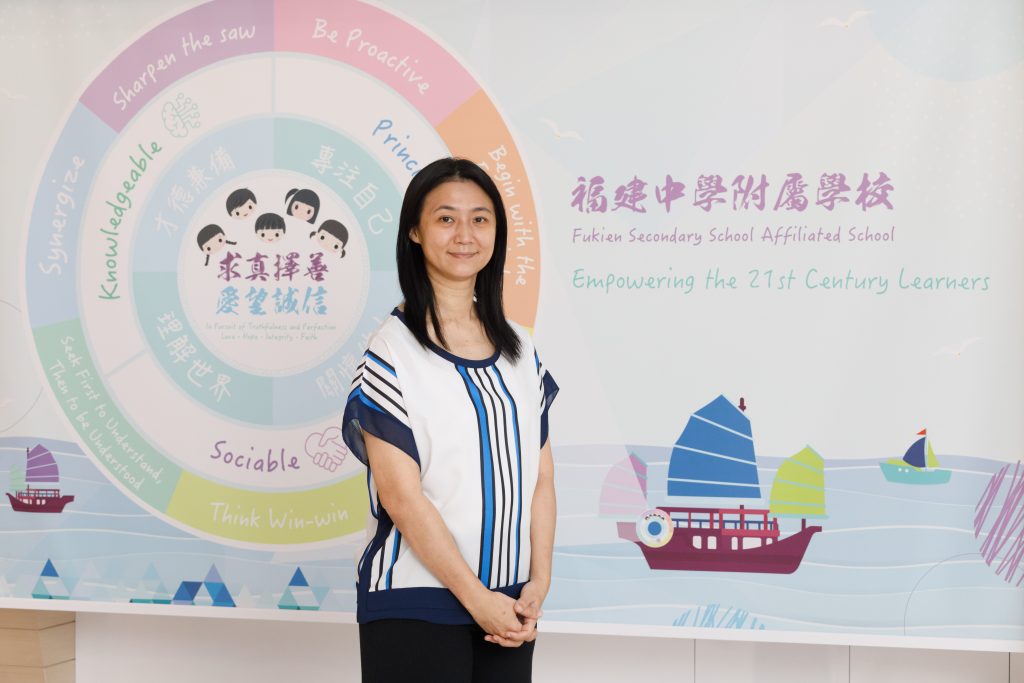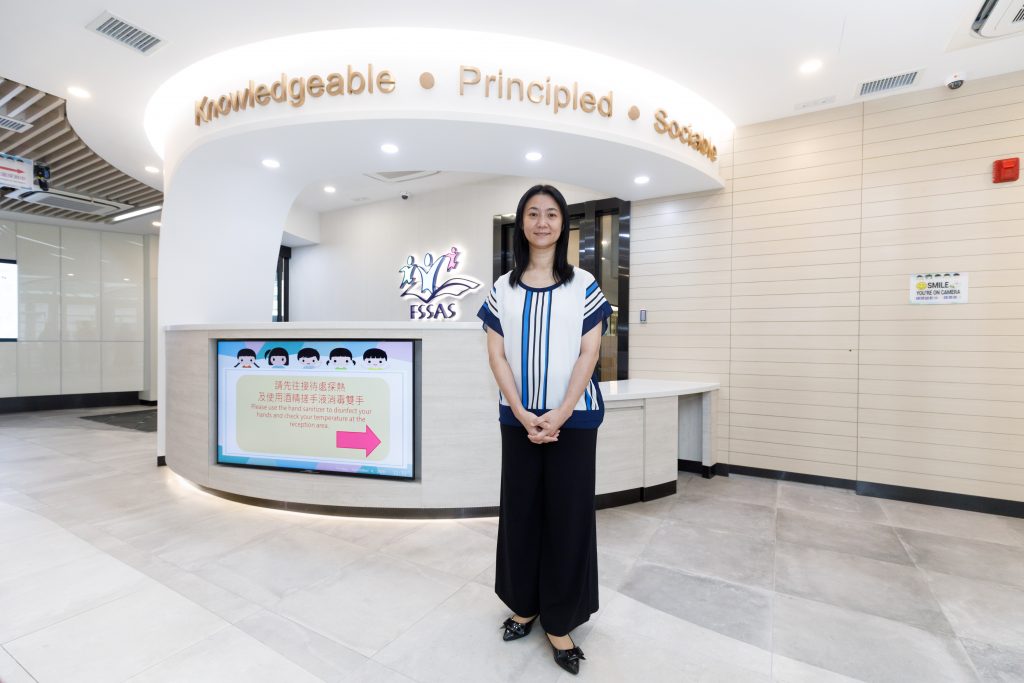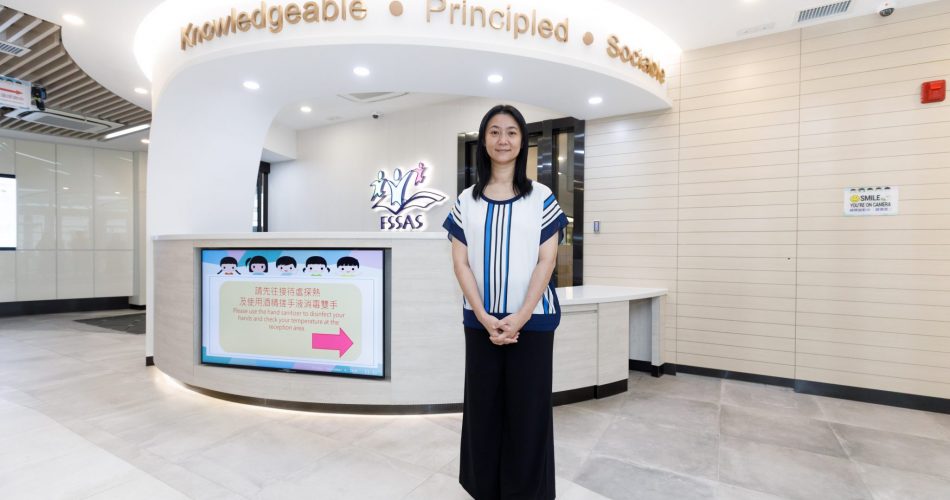The Fukien Secondary School Affiliated School is a popular local DSS English co-educational primary school. In addition to outstanding academic performance, its cutting-edge teaching methods, high standards of moral education, emphasis in holistic development, vigorous learning environment, and harmonious relationships among teachers, students and parents are reasons why the school is sought-after. “We always put our students as our top priority,” Principal Eva Hsu remarks.

Principal Eva studied in a traditional Catholic English school that loaded students with homework. When she was about ten years old, she read Japanese writer Kuroyanagi Tetsuko’s “The Little Girl at the Window”, which is about an autonomous school where students can design their own learning schedules according to their interests – what to learn first and what to do later. “This book inspired my thoughts on education. When I grew up, I took an education diploma and learned the skill set of being a teacher. Later, I pursued an education degree at the Chinese University of Hong Kong, opening my eyes to the most advanced teaching methods around the world. After graduation, I started serving in the education sector but found that the philosophies and theories I acquired could not be implemented in the education system here. Fortunately, through teaching in different schools, I also met principals who were open to bringing new synergies onto the campus and letting me experiment with different methods. With years of experience under my belt, I realized the importance of preserving traditions while implementing innovation, and balancing theories with the reality.”
A balance between theories and the reality
The Fukien Secondary School Affiliated School combines tradition and autonomy to facilitate practical and effective learning. “We value a solid academic foundation. Although information is readily available on the Internet today, we can analyze things more quickly if there are relevant memories and knowledge in our brain. Regardless the numerous skills we teach, students must have a solid academic foundation just like even the best software needs proper hardware to function. In addition, the teacher’s guidance and student’s autonomy should be balanced. Parents back in our generation were strict and had absolute authority; while parents nowadays advocate giving absolute freedom to their children. Neither extreme is advisable. In fact, children need and want guidelines and direction but also opportunities of making decisions to cultivate their self-confidence and independence.”
Principal Eva said that her ideal educating mode is “The Dolphin Way” (taken from Dr. Shimi Kang’s book “The Dolphine Way: A Parent’s Guide to Raising Healthy, Happy, and Motivated Kids – Without Turning into a Tiger”) . “The parents are in control but do not make all the decisions or suppress their children. Instead, they would analyze the pros and cons for them and let them come to their own conclusions. Take my daughter as an example: she has always done well in time management. However, during class suspension, she made a lot of effort to adapt to online studying at home. After the summer holiday, going back to school was admittedly a bit difficult for her, and there were times when I noticed that she was procrastinating. I would explain to her clearly and let her analyze the pros and cons to make decisions on her own, for example: ‘If you do it now, I will assist you; if not, I will not remind you again, and you will have to tackle it yourself should any difficulty come up later.’ Parents must firmly believe that children need to be responsible for their own work. At the same time, they must adhere to their principles, guide children step-by-step, help them gradually develop in the right direction and eventually become independent. How can we encourage children to take initiative? When they are young, we must instill an idea in them: the reason why the world is so beautiful is because everyone is doing their best to bring positive changes to the world. We must also let them understand that they have a responsibility to discover their strengths and do their best to contribute to the world.”
A new approach to education
Moral education is an important part of the Fukien Secondary School Affiliated School. Principal Eva said, “If parents have not established ethics and guidelines for their children, they will encounter various challenges when they grow up like a broken kite flying without direction. Morality is not easy to teach, especially in a utilitarian society, where there is much conflict between personal interests and moral values. Even if we teach children concepts of truth, kindness and beauty, they will overthrow our lessons once they realize that the real world is nothing like what they have learned from the books. To implement moral education, we must pay attention to two points: building a solid foundation on morality for our children, as well as teaching them how to pursue these values in the real world. We teach children honesty in a world that is not honest, so what should we teach them to do? How can we not violate our own principles and not connive with the bad apples of our society? How can children apply their inner values to the world? This is exactly what children want and need to know. We pay special attention to the implementation of morality and have clearly listed 50 good behaviours that our graduates should have, to foster morality in them. In addition, we also teach our students via experiential learning, so they can learn to apply moral values to the world through specific examples.”
“In conclusion, the educational philosophy of our school can be summarized into three words written at the reception area of the school: ‘knowledgeable’, ‘principled’ and ‘sociable’. They also echo the three core elements proposed by Peter Senge and Daniel Goleman in their book ‘The Triple Focus: A New Approach to Education’.”

The Fukien Secondary School Affiliated School employs a direct strategy to examine its effectiveness in teaching and learning. “A mentor once told me that students’ performance reflects the effectiveness of teaching and learning. If students have mastered the knowledge when they leave the classroom, the lesson was effective; if students fail to grasp knowledge in class and are relying on after-school tutorials, or only students that are weak or strong in comprehension can benefit from the lesson, then teachers must further hone their skills. We put a great effort in teachers’ professional training and also encourage students to demonstrate their academic performances. Every student in Primary Three to Six is provided with a tablet. Before class, students would collect the tablet. When the school day is over, they would put it back in the locker and recharge the battery. The purpose of this practice is not for keeping up with the development of science and technology, but to effectively review students’ learning effectiveness. During the lesson, the teacher would distribute tasks through the tablets, and students would give instant feedback, so that the teacher could understand the learning difficulties and follow up immediately. This feedback loop is developed based on the concept of big data.”
The pioneering school’s curriculum covers a wide variety of content across different levels. For example, for English, the school adopts learning materials developed from National Geographic. The objective is to boost students’ English proficiency to near native and also offer them a global perspective. As for Chinese classes, teachers use interesting materials such as idioms, ancient poems and the etymology of Chinese characters to cultivate students’ passion in taking up the language. Mathematics adopts an Asian curriculum, making reference to Singaporean model-method pedagogy. General Studies is divided into three categories: the first is an enquiry-based learning course related to science called “Thematic Studies”, whereby the teaching objective encourages students to apply scientific knowledge to everyday life while fostering their design thinking. The exam includes case studies and data analysis. The second category is pastoral training; it is related to moral and affective education with teaching materials developed from “The 7 Habits of Highly Effective People”. The final category is cultural learning such as Chinese history, and values are taught through “The Standards of Being A Good Pupil” and “The Three Character Classic”. Besides typing practices, PowerPoint-making and video- editing, Information Technology classes also teach coding, robotics and Apps composing. In terms of sports, the school has a unicycle and a floorball school team, both of which are mandatory for all students in the school – surely a pioneering feat for schools in Hong Kong.

The series of political events and the COVID-19 pandemic are unprecedented and complicated for children to fully comprehend. Here is Principal Eva’s advice to parents: “The happiness of children depends on their parents’ expectations. Children regard parents as their role models and mirror their views on life. They are born innocent and are shaped by their parents. If parents have a bleak view on the future, children naturally take in their biases. Aren’t unwarranted disasters brought upon by wars much more unbearable than the inconveniences caused by the pandemic? Facing the current social situation, some will be overly optimistic and hope that everything can go back to normal without costs, but the result may not turn out as expected; some will be overly desperate, feeling that the situation cannot be undone and wading in negativity even if the current situation improves. To help primary students face the current situation, let them understand the development of human history: certain times in the past were difficult, but they eventually got better. When children play, they shall play worry-free; if there is a duty for them, they shall do it wholeheartedly. They should not worry too much about the incomprehensible future. Although adults may also be anxious, parents should do their best to protect their children from negative emotions and help them feel parents’ unweaving support despite any difficulties.”
Special thanks to Eva Hsu, Principal of the Fukien Secondary School Affiliated School.

